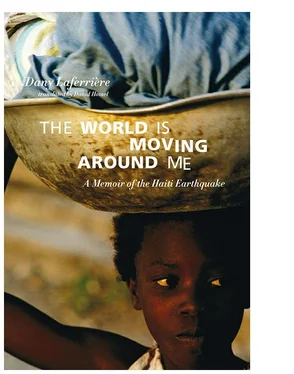Living Together
I wonder what happens in those tents that have sprung up everywhere. How do people manage to preserve their private lives? Do men who snore too loud have to sleep during the day to keep from waking everyone up at night? People are experiencing a dual misfortune: individual (they have lost friends and family) and collective (they have lost their city). How do they find a way to mourn their dead when it’s so difficult to find a moment to yourself? It’s easy to imagine idyllic scenes under starry skies, but where do people actually make love? In thickets, where cries of pleasure won’t be heard. They say that in some camps, there’s an empty tent with a sign that says “For the moment.” A way of having a sweet interlude in a discreet setting. We know that neither fear nor pain nor indigence will keep desire from flowering. It doesn’t take very much: the bend of a neck, eyes that linger — and everything changes. It’s the only thing that can get our minds off a difficult situation. And how is food shared with new neighbors? Does family hierarchy continue in a tent city? Living in a group requires constant discretion if you don’t want to offend other people. The poorest are ahead in this game, since they’re used to rubbing elbows; they’re not afraid of touching each other. Some individuals feel physical revulsion at the idea of rubbing up against people they consider lower class. It’s possible that an unexpected situation, if it lasts long enough, will cause major changes in people’s lives.
Reading in a Tent
For adults, it’s desire. For kids, reading. A child lost in The Three Musketeers isn’t living in a tent. He’s in a Dumas novel. A life of adventure. Galloping through the night. When he gets tired, he stops at an inn and wakes the innkeeper, who was sleeping next to the missus in his nightcap. He sits down before a copious meal after ordering a bale of hay for his horse, which has been sent to the stables. It is no easy task, for the roads are not safe. Suddenly, he is surrounded by a group of masked riders. Just as d’Artagnan is about to unsheathe his sword, he hears a voice that is too familiar and too shrill to be Milady’s. It’s the young reader’s mother calling him for supper. She smiles when she sees her son come running with a book under his arm.
The Prodigal Son
I went back to the Hôtel Karibe, where it all began. The feeling of returning to the scene: one foot in the past (that vibration again) and the other in the present. Which has me shaking a little. I didn’t go through the front door for fear the return would be too sudden. I chose the side entrance, the exact spot where I met Saint-Éloi who had just arrived on that January 12, about 3:30 pm. The conference room wasn’t too badly damaged. I went through the courtyard. The rear façade of the hotel has been repaired. I stepped onto the tennis courts where shadows once moved. The swimming pool, its surface unmoving. The garden with its flowers that withstood the earthquake. In the restaurant, I came upon the owner who hugged me passionately. When I congratulated him for not having lost his cool during those difficult days, and most of all for having stayed with his guests when he could have gone home to sleep, he told me confidentially, “Instead of destroying me, the tragedy gave me the energy I needed to do better.” Just then the waiter appeared, the same one who was serving us just before the earthquake. The plump man was wearing the same warm smile he’d never lost, even at the worst times of the crisis. I reminded him I was still waiting for a lobster, and that he had gone to get it when the earthquake struck. He gave me a sly smile, then disappeared into the kitchen. I was talking with a chambermaid when he returned bearing a lobster. So fast? He’d wanted to surprise me and sent the order as soon as he saw me come through the gate. We laughed. I was moved. I sat down at the table where I’d been on January 12, when disaster visited us, and this time I was able to enjoy my lobster in peace.
The Tenderness of the World
Wherever I go, people speak in low voices. Their conversations are cut with silence. Eyes averted, they reach for my hand. Through me, they hope to speak to the island that has been wounded, but has escaped its isolation. People ask me for news. They quickly realize they are better informed than I am. I removed myself from that poisonous buzzing, better to preserve the images that burn inside me. On the first night, that little girl who was worried if there would be school the next day. Or the mango lady the following morning, sitting on the ground, back against a wall, with her pile of mangos for sale. When people speak to me, I see in their eyes that they are addressing the dead, while I am clinging to the slightest crumb of life. But what really touches me is how moved they seem by their own emotion and how they hope to keep it with them as long as possible. They say one catastrophe replaces another. Journalists can go prospecting elsewhere, but Haiti will continue to occupy the heart of the world for a long time to come.
How It Came to Be
Three Hotel Rooms and a Train
The way this book forced itself on me is really no surprise. On the tennis court, I made up my mind not to let the earthquake upset my schedule. Not that I’m insensitive to what happened. When I close my eyes, the images come rushing back in all their horror. The only way I can breathe is to move. I owed my publisher Rodney St-Éloi a book. It was supposed to be notes about writing. On my previous visit to Port-au-Prince, my nephew wouldn’t stop bugging me with all his questions about style. I refused to answer; the issue is bound up with the act of writing itself. Which is like saying you learn to write by writing. Good writers are their own masters. The main thing is to be attentive to two fundamental points: music and rhythm. If you have a tin ear, you might as well do something else. No one can teach you how to write a sentence that sounds good. My nephew kept insisting. He was looking for specific advice. “And not another book that’s going to make me feel desperate,” he called on his way to the bathroom. I ended up accepting the challenge. The title was ready-made: Notes to a Young Writer in Pajamas . I know it might sound pretentious to start giving advice. But I figured that over the last thirty-five years, I must have learned a thing or two about writing that I could tell him. Like keeping the spontaneity that adds so much charm. Everything seems much too clean these days (now the old man is judging his contemporaries). Buffon was right when he said that style is the man. I like to feel there’s someone behind the door. Even if you have talent, you can’t make it without character. The book ( Notes to a Young Writer in Pajamas ) was finished, but it still required careful rereading. I needed time to write. I had two weeks to make the necessary corrections. Don’t go thinking that those two weeks were waiting for me with a smile. Every day was filled with something else. I’ve understood for some time now that I can have whatever I want — except time. André Breton was a prospector for the gold of time. I don’t have it. Don’t have it any more. The freer I feel in my mind, the less I belong to myself. Freedom gives off a scent that attracts people. I looked at my calendar. Three trips in the month of March. I had two weeks before the book was due at the publisher’s. I threw my notebook and my little Toshiba computer into my suitcase.
Tallahassee Hotel
Last year, Martin Monroe, a professor and specialist in Caribbean literature, invited me to a colloquium on contemporary Haitian literature. I couldn’t really refuse since I had just gotten through declaring in Port-au-Prince that culture was the only thing Haiti had produced in the last two hundred years. Culture is the only thing that can stand up to the earthquake. I’m not only talking about intellectual culture, the kind that comes from books, but what structures a nation. If we don’t want to turn into a victim nation, we have to keep moving. We’ll cry later when things are better. In the meantime, let’s go forward. That was my decision. The hotel wasn’t far (a twenty-minute walk) from Florida State University where my eldest daughter studied French-language literature. Why an American university? “American schools are loaded with money,” she told me at the time. “They can line up three Nobel Prize winners at the same table.” Really? This big conference about Haiti had been in the works for two years. It was my first contact with a university since my return. I decided to add a short text about the earthquake at the end of my book about style. I would relate my first impressions when the tremors struck. That turned out to be my Pandora’s box. Gold fever. Every time I had a free moment, I slipped back to my room. If I had one piece of advice for a young writer, it would be this: “Write about what makes you passionate. Don’t look for the subject; the subject will find you.” Except that it doesn’t always show up at the right time. I was supposed to be correcting a book that had been advertised everywhere. An anxious publisher was waiting for it. That’s not the time to let yourself get distracted by something new. But a good subject sets off energy in me that’s like physical passion. It’s all I could think about.
Читать дальше












